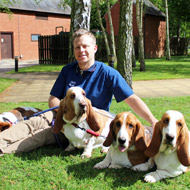
AHT launch DNA test to help breeders control the disease
A new form of glaucoma in basset hounds has been discovered by the Animal Health Trust (AHT).
The condition - primary open angle glaucoma (POAG) - was discovered by an AHT vet during a routine examination of three basset hounds.
Experts from the AHT's Kennel Club Genetics Centre have now identified the mutation responsible for the condition and a DNA test has been launched to help breeders control the disease.
Primary glaucoma is an inherited condition which is split into two types: closed angle glaucoma (PCAG) and POAG. Both forms result from reduced drainage of fluid within the eye, causing a build up up pressure which eventually leads to pain and blindness.
James Oliver, a specialist ophthalmologist at the AHT, discovered signs of POAG during a routine examination of three basset hounds. He was investigating PCAG in several popular dog breeds for his PhD.
"I’ve examined thousands of dogs as part of my PhD study into PCAG but this is the first time I’ve stumbled across a form of the disease in a breed that I wasn’t previously aware of," says James.
"POAG has never been recorded before in the Basset Hound, so it’s a really interesting and important discovery for the breed.
“What’s more, as it seems to be an emerging disease in the Basset Hound, the fact that we’ve been able to find the genetic mutation and launch a DNA test so quickly means that breeders should be able to nip this form of glaucoma in the bud before it becomes a wide-spread problem.
“Although we may not have seen many Basset Hounds affected by this form of glaucoma the carrier rate is estimated to be at about 16% in the UK Basset Hound population, which is relatively high. Therefore DNA testing before breeding is going to be really critical in order to get this form of glaucoma under control in this lovely breed.”
The DNA test will cost £48 and is now available to order from the AHT's DNA Testing Service.
Image (C) Animal Health Trust



 The latest
The latest